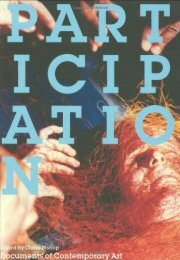New Aesthetic New Anxieties - Institute for the Unstable Media
New Aesthetic New Anxieties - Institute for the Unstable Media
New Aesthetic New Anxieties - Institute for the Unstable Media
You also want an ePaper? Increase the reach of your titles
YUMPU automatically turns print PDFs into web optimized ePapers that Google loves.
crisis-ridden economic condition, is impossible to "wish away;" <strong>the</strong>re is contrarilly a"special relation today between <strong>the</strong> mode of production and its ma<strong>the</strong>matics"(11). The <strong>New</strong> <strong>Aes<strong>the</strong>tic</strong> found this special relation, in its absolutely direct capturing ofits patterns, channels and economies of attention.Implications of an Apolitical <strong>New</strong> <strong>Aes<strong>the</strong>tic</strong>If it is not obvious by now, we have been as a collective differently innervated,perplexed and ambivalent about this thing called <strong>the</strong> <strong>New</strong> <strong>Aes<strong>the</strong>tic</strong>. While we arekeen to distance ourselves from a possible passive reading/writing of its style, a stylethat we have described as riparian, in as much as it encourages consumption of acertain kind of digital product(ion), <strong>the</strong> <strong>New</strong> <strong>Aes<strong>the</strong>tic</strong> as a case has delivered to usmore understanding of <strong>the</strong> present condition and <strong>the</strong> possibilities of using media toreconfigure things a little. The way that <strong>the</strong> phenomena so strongly linkedcomputation with consumption and aspects of <strong>the</strong> neoliberal economic reality,enabled us to generate new insights and questions; <strong>for</strong> example, about <strong>the</strong> care <strong>for</strong>artistic and creative work, that we have captured in <strong>the</strong> curatorial anxieties stressed in<strong>the</strong> middle section of this book. It has felt crucial, moreover, that <strong>the</strong>se complexassocations that we have generated in proximity to <strong>the</strong> thing create reflexivearticulations. Here, we are recognizing our own potential breaks from computationaland calculative reason. As Darrow Schecter notes,The exercise of power and <strong>the</strong> <strong>for</strong>malisation of knowledge to be intimatelybound up with <strong>the</strong> constitution of living individuals as subjects ofknowledge, that is, as citizens and populations about whom knowledge issystematically constructed... Subjects are not born subjects so much as<strong>the</strong>y become <strong>the</strong>m. In <strong>the</strong> course of becoming subjects <strong>the</strong>y are classifiedin innumerable ways which contribute to <strong>the</strong>ir social integration, even if<strong>the</strong>y are simultaneously marginalised in many cases. (Schecter 2010: 171)Our neoliberal selves have become more strongly attached to <strong>the</strong> norms of 'marketcivilization' through specific combinations of rationalities, strategies, technologies andtechniques that mobilize government at a distance, and by manipulations of powerthrough <strong>the</strong> economic and discursive networks of a massively deregulated andexpanding new media (Gupta and Sharma: 2006).The most conventional anxiety around neoliberal subject <strong>for</strong>mation is that this modeof governmentality reduces citizens to consumers only, enfolding all of life and cultureto its representational practices. This is its logic of course, but it can not be ever fullyachieved. As Wendy Brown (2006) has argued, <strong>the</strong> difference of <strong>the</strong> regimes andpractices of neoliberal transition is that <strong>the</strong>y emphasize market rationality as analready-achieved state, ra<strong>the</strong>r than an aspiration. This gives neoliberalism ateleological <strong>for</strong>ce and ordinariness that is difficult to counter, and unpack. It issignificant twist of already-realized market rationalization that has significantramifications not just on a <strong>the</strong>ory of <strong>the</strong> subject, but following from this, on any <strong>the</strong>oryof <strong>the</strong> spectator or user of art, media, design, and culture. The <strong>New</strong> <strong>Aes<strong>the</strong>tic</strong>acknowledges <strong>the</strong> ensconcement of neoliberalism in subjectivity, but to thinkaes<strong>the</strong>tics 'now', how can we think beyond this?58








